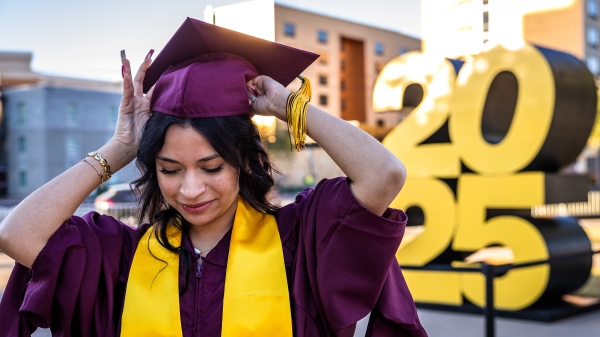Commencement speaker: ASU graduates must have both skills, integrity

Author and researcher John Seely Brown addresses Arizona State University's undergraduate commencement May 11. Brown is known for his work on ubiquitous computing, service-oriented architectures, global innovation networks, social technologies and learning ecologies. Photo by: Charlie Leight/ASU Now
The skills the graduating class of 2015 learned at Arizona State University are key to career success – but just as crucial are authenticity and integrity, according to John Seely Brown, author, researcher and ASU’s undergraduate commencement speaker.
Brown compared the era Monday’s graduates enter to the one their parents and grandparents encountered.
“This is a different world. A world where skills matter, tools matter, but expertise and authenticity are also required,” Brown told the degree recipients on Frank Kush Field at Sun Devil Stadium. “It’s a world of powerful tools galore, and a world of immense opportunities, if – I stress if – you’re willing to unleash your imagination while invoking your skills.”
Brown used the metaphor of a kayaker coursing down a rapid-filled river to explain the multitasking that will be required of today’s graduates to be successful.
“You’re living in a whitewater world,” Brown said. “You must be more like a whitewater kayaker, who skillfully reads the currents and disturbances of the context around you, interpreting the flows, the ripples, the rapids, for what they reveal of what lies beneath the surface.”
Sun Devils are in luck, Brown argued, because ASU is one of the best at preparing graduates for that task.
“You have experienced here the New American University – a new kind of university that is striving to create transdisciplinary learning environments,” Brown said. “Knowledge [and] creation spaces that cultivate the imagination so that you, as entrepreneurial learners in the network age, are empowered for your future.”
University President Michael M. Crow, introducing Brown, called him one of the “few individuals on the planet” envisioning new ways to teach and learn.
“You have been truly inspirational to us, to this institution and to all that we do,” Crow said, bestowing an honorary doctorate of humane letters on Brown. “We appreciate that very much.”
Brown, known by colleagues and friends as JSB, has been an innovative thinker on issues as diverse as science, mathematics, the media and the future of higher education for years.
“John is the definition of a polymath,” said Jonathan Taplin, a professor and director of the Annenberg Innovation Lab at the University of Southern California, where Brown is a visiting scholar. “He understands more about more things than almost anybody I’ve ever met.
“There’s no one better than John Seely Brown at thinking about where the future of education ... is going.”
Brown, who is an adviser to the provost at USC, presented a discussion earlier this year about the future of higher education titled “Cultivating 21st-Century Agile Learners.”
At commencement, he praised Crow for creating an environment to produce those learners.
"Thank you for having the imagination, skill and courage to show America that higher education can seriously innovate and strive for excellence for the benefits of all social economic groups.”
ASU conferred degrees on about 8,500 undergraduates at Monday evening’s commencement exercises.
Noted planetary scientist Carolyn Porco also received an honorary doctor of science degree from ASU at the ceremony.
At the start of the proceedings, Crow welcomed the graduates and reminded them they have “roughly 22,000 days” in the rest of their adult lives.
He charged them to use that time to tackle America's toughes challenges, such as improving the level of justice for all members of society, addressing threats to economic and individual liberty, and managing problems like the ongoing drought in California.
“You have one mission,” Crow said, “to design new ways to solve all of these problems.”
Brown’s guidance on how to do that: “Embrace the endless possibilities of the whitewater world.”
“I envy you,” he said. “You are graduating and embarking on your life at an amazing time.”
He ended his remarks with a wish that all students – and their parents – would feel grateful to have come true.
“Thank you, and may you have a prosperous life.”
More University news

Year in review: ASU's top stories for 2025
It has been a year of big announcements and bold research discoveries, as Sun Devils worked to make lives better across Arizona…

ASU launches Operation Comeback to help Arizonans finish their degrees
Arizona State University has launched a new initiative called Operation Comeback to help Arizona residents who started college at…

Fall 2025 grads encouraged to enter next chapter of life with optimism
Newly minted Arizona State University graduates were urged to help America strive toward a greater democracy as they celebrated…